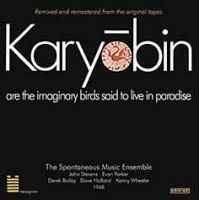Home » Jazz Articles » Album Review » Spontaneous Music Ensemble: Karyobin
Spontaneous Music Ensemble: Karyobin
The Spontaneous Music Ensemble (SME) had released their first album, Challenge in 1966 on the small Eyemark label. At that stage, SME was centred around drummer John Stevens, trombonist Paul Rutherford and saxophonist Trevor Watts, who had met each other while on national service in Germany. Although largely improvised, the music still featured compositions credited to one of the three and the rhythm section was still conventional enough to make it mistakable for free jazz. By summer 1967, SME consisted of Stevens plus saxophonist Parker, then aged 23. However, when the offer came for SME to make an LP for Island, the two saw it as a perfect opportunity to invite trumpeter Kenny Wheeler, guitarist Derek Bailey and bassist Dave Holland to join them in a quintet. Wheeler had played on Challenge and continued playing occasionally with SME into the 70's. Bailey had guested with Stevens and Parker in SME but was not yet a household name; remarkably, on the Island LP he was credited as Dennis Bailey! Holland is better known as a jazz musician than an improv player; before the end of 1968, he had been recruited by Miles Davis to join his band and was recording Filles de Kilimanjaro.
Despite not playing together regularly, this quintet clearly had no problems gelling and finding common ground. Straight from the off, they sound like a long-established quintet who are easy in each other's company. The music consists of six tracks which are entitled so that they sound like parts of a suite but, in fact, it was freely improvised by the quintet. Their playing was based on two simple rules of Stevens': "If you can't hear somebody else you are playing too loud" and "If what you are doing does not, at regular intervals, make reference to what you are hearing other people do, you might as well not be playing in the group." Judging by the coherence and empathy displayed across the six tracks, neither of those rules proved to be a problem for any of the five. There is a consistency of sound and approach which does make the six tracks like the composed parts of a suite, but enough individual creativity to make it obvious that all five were improvising throughout. A classic.
Track Listing
Karyōbin Part 1; Karyōbin Part 2; Karyōbin Part 3; Karyōbin Part 4; Karyōbin Part 5; Karyōbin Part 6.
Personnel
Kenny Wheeler: trumpet; Evan Parker: soprano Saxophone; Derek Bailey: amplified guitar; Dave Holland: double bass; John Stevens: percussion.
Album information
Title: Karyobin | Year Released: 2017 | Record Label: Emanem
< Previous
Cuban Nocturne
Next >
II
Comments
Tags
For the Love of Jazz
 All About Jazz has been a pillar of jazz since 1995, championing it as an art form and, more importantly, supporting the musicians who create it. Our enduring commitment has made "AAJ" one of the most culturally important websites of its kind, read by hundreds of thousands of fans, musicians and industry figures every month.
All About Jazz has been a pillar of jazz since 1995, championing it as an art form and, more importantly, supporting the musicians who create it. Our enduring commitment has made "AAJ" one of the most culturally important websites of its kind, read by hundreds of thousands of fans, musicians and industry figures every month.



















